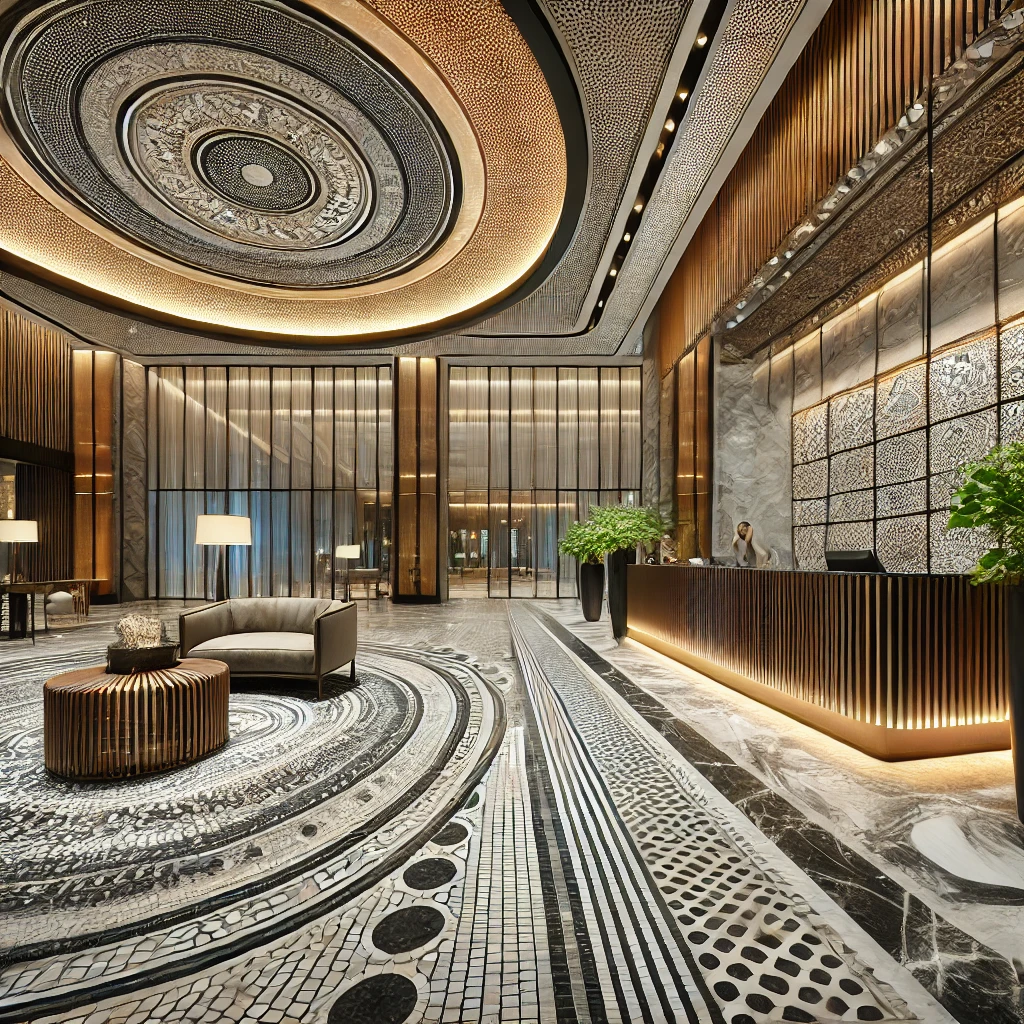Introduction
Mosaic tiles, known for their versatility and aesthetic appeal, have become a popular choice in various commercial spaces. From luxury hotels to bustling retail stores, these tiles add both functionality and visual interest to a wide range of environments. This guide explores how mosaic tiles are used in different commercial settings, highlighting their benefits and offering design insights for business owners and designers alike.
1. Hotels and Resorts
- Lobbies and Reception Areas: The first impression is crucial in hospitality, and mosaic tiles play a significant role in creating a welcoming atmosphere. In hotel lobbies and reception areas, mosaic tiles are often used on floors or walls to create eye-catching designs. Large-scale mosaic patterns or intricate floor inlays can convey luxury and sophistication, setting the tone for the entire guest experience.
- Pools and Spa Areas: Mosaic tiles are a staple in hotel pools and spa areas due to their durability and water resistance. These tiles can be used to line the pool floor, walls, and even water features, creating a cohesive and relaxing environment. The variety of colors and finishes available allows for creative designs that can enhance the calming atmosphere of these spaces.
2. Restaurants and Cafés
- Flooring and Walls: In restaurants and cafés, mosaic tiles are commonly used on floors and walls to create a unique ambiance. Whether it’s a rustic bistro or a modern eatery, the choice of mosaic tiles can reflect the brand’s identity. In kitchens and behind bars, mosaic tiles serve a dual purpose: they are easy to clean and maintain while also adding a stylish backdrop to the space.
- Bar Tops and Counters: Mosaic tiles are an excellent choice for bar tops and counters, where they can create a stunning focal point. In upscale dining establishments, intricate mosaic patterns on the bar can enhance the customer experience, making the space feel more luxurious and inviting.
3. Retail Stores
- Storefront Displays: In retail, first impressions are everything. Mosaic tiles are often used in storefront displays and interior walls to attract customers. Custom mosaic designs can be tailored to reflect the brand’s image, making the store stand out in a crowded shopping environment.
- Fitting Rooms and Display Counters: Inside retail stores, mosaic tiles can be used in fitting rooms and on display counters to add a touch of elegance. These spaces often serve as extensions of the brand’s identity, and the use of mosaic tiles can create a cohesive and memorable shopping experience.
4. Offices and Corporate Headquarters
- Reception Areas and Conference Rooms: In corporate settings, the use of mosaic tiles in reception areas and conference rooms can convey a sense of professionalism and attention to detail. Modern mosaic designs, especially those incorporating metallic or glass elements, can enhance the contemporary feel of these spaces, aligning with the company’s brand values.
- Employee Break Rooms: Mosaic tiles are also ideal for employee break rooms, where they can add color and texture to the space. A well-designed break room can boost employee morale and productivity, making mosaic tiles a practical and attractive choice for these areas.
5. Shopping Malls and Retail Centers
- Public Walkways and Atriums: In large shopping malls and retail centers, mosaic tiles are commonly used in public walkways and atriums. These high-traffic areas require durable flooring that can withstand heavy use while still looking attractive. Mosaic tiles offer the perfect solution, combining durability with the ability to create stunning visual effects.
- Elevators and Staircases: Elevators and staircases in commercial spaces often feature mosaic tiles for both aesthetic and functional reasons. The tiles provide a slip-resistant surface, enhancing safety, while their intricate designs add an element of sophistication to the overall mall design.
6. Gyms and Health Clubs
- Pools and Sauna Areas: In gyms and health clubs, mosaic tiles are frequently used in pool areas and saunas. These environments require materials that can handle moisture and frequent cleaning, making mosaic tiles an ideal choice. The wide range of colors and textures available allows designers to create spaces that are both functional and visually appealing.
- Shower Areas and Changing Rooms: Mosaic tiles are also used in shower areas and changing rooms within health clubs. Their anti-slip properties and resistance to water make them perfect for these wet environments, while their design flexibility allows for the creation of soothing, spa-like spaces.
7. Bars and Nightclubs
- Dance Floors and Bar Areas: Bars and nightclubs often use mosaic tiles on dance floors and bar areas to create a vibrant atmosphere. The reflective properties of glass and metallic mosaics can amplify lighting effects, making these spaces feel more energetic and dynamic.
- Wall Art and Custom Designs: In addition to functional uses, mosaic tiles are often employed as art installations or custom designs in nightclubs. These installations can serve as conversation pieces and enhance the overall aesthetic of the venue, making it a more memorable experience for patrons.
8. Commercial Bathrooms and Restrooms
- Public Restrooms: In commercial restrooms, mosaic tiles are a popular choice for walls and floors due to their ease of cleaning and resistance to moisture. Beyond their practicality, mosaic tiles can also add a touch of luxury, making even a simple restroom feel upscale.
- Backsplashes and Vanity Areas: Mosaic tiles are also used in vanity areas and behind sinks in commercial restrooms. These tiles can serve as a decorative backsplash, protecting the walls while adding a stylish design element.
9. Hospitals and Healthcare Facilities
- Reception Areas and Hallways: In healthcare facilities, mosaic tiles are often used in reception areas and hallways to create a welcoming and calming environment. The use of soft, soothing colors in mosaic designs can help reduce stress for patients and visitors.
- Patient Room Bathrooms: In patient rooms, bathrooms often feature mosaic tiles due to their durability and ease of cleaning. The tiles’ slip-resistant properties also contribute to patient safety, making them a smart choice for healthcare settings.
Conclusion
Mosaic tiles offer a versatile and durable solution for a wide range of commercial applications. From creating stunning focal points in hotels and restaurants to providing practical, easy-to-maintain surfaces in gyms and healthcare facilities, mosaic tiles combine beauty and functionality. By carefully selecting materials, colors, and designs, business owners and designers can use mosaic tiles to enhance the aesthetics and practicality of their commercial spaces, ultimately creating environments that are both inviting and effective.



